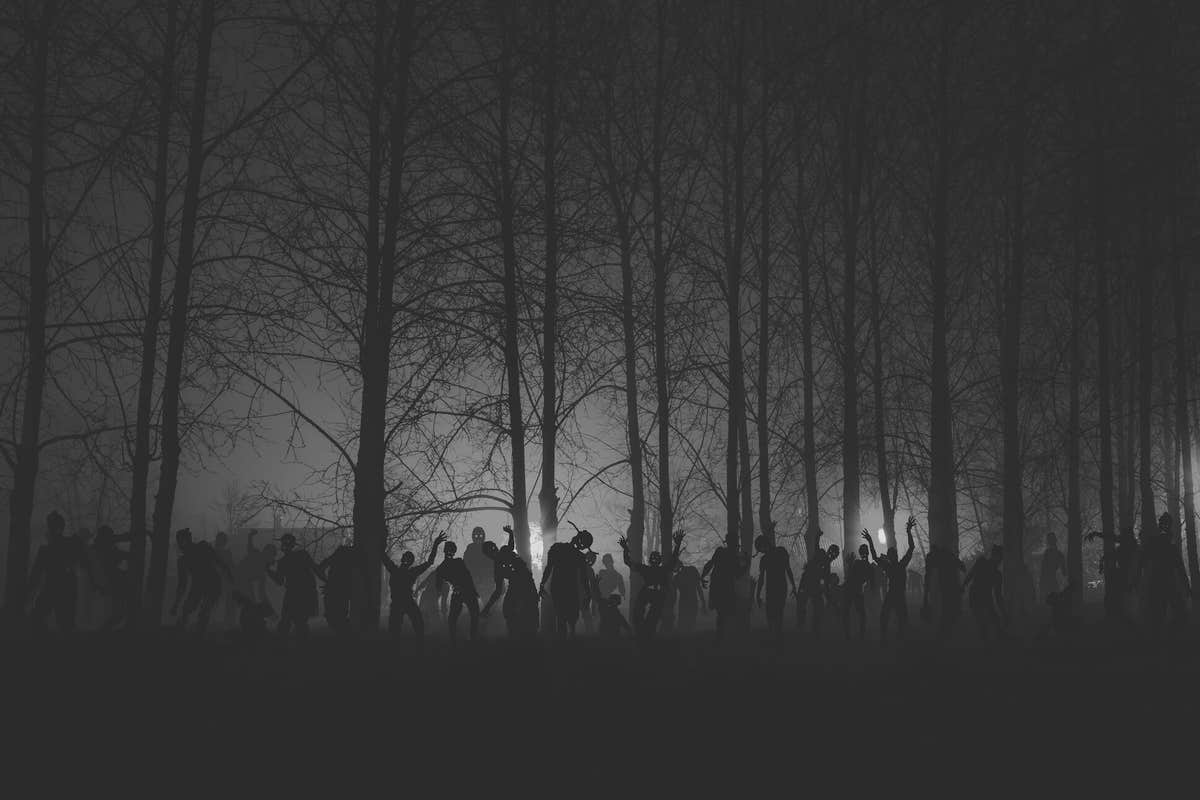Your homeowner's insurance may cover damage from the zombie apocalypse. Yes, you read that right.
We’ve all seen the movies about zombies: usually, a virus breaks out and suddenly friends and neighbors are transformed into the decaying, lumbering undead, hungry only for brains and flesh. Society collapses. Heroes rise up. An enduring battle between the living and the dead ensues.
It all seems far-fetched until one day you wake up in the year 2020, watching a pandemic play out in real-time, and suddenly you’re making plans for all those worst-case scenarios you never thought would happen.
So let’s do the thought experiment. In the event of a zombie apocalypse, would homeowners insurance save the day? And how exactly do you prepare for an event like that?
A brief history of zombies and zombie insurance
You may know zombies from The Walking Dead, Dawn of the Dead, Resident Evil – you name it. Zombies are part of our cultural landscape – and they’ve been around longer than you might think.
Archaeologists found evidence of what could be an old fear of the undead when they discovered graves from Ancient Greece with skeletons pinned down by rocks. Historians theorize these were meant to keep the dead from rising up.
But modern zombies may have tragic roots in 17th century Haiti where enslaved people from West Africa were forced to work on brutal sugar cane plantations. As the Atlantic puts it, the zombie archetype represents the misery of slavery, of being trapped in a body and denied its autonomy.
The idea of the zombie further evolved through voodoo, a religion practiced throughout Haiti and the Caribbean. Some believe zombies are people revived by voodoo practitioners (called bokors) through the use of “zombie powders” that contain tetrodotoxin. This is a neurotoxin usually found in pufferfish, and sub-lethal doses of it can cause zombie-like symptoms, like respiratory problems, brain fog, and that famous zombie gait.
What is zombie insurance?
Zombie insurance is a relatively new concept propelled into existence by the popularity of movies and shows like The Walking Dead. The term usually refers to property coverage for a zombie apocalypse, but zombie insurance can also be used to describe:
- Instances of life insurance fraud. For example, when someone makes a claim on a life insurance policy for someone who isn’t yet dead.
- Environmental liability coverage for properties long after they’ve been sold. At least that’s what Max West of Aon refers to it as. This coverage protects a seller if they’re sued over selling properties with environmental contaminants they didn’t know about at the time of the sale.
For our purposes, we’ll focus on zombie insurance for property damage. Let’s see whether your home insurance policy might include it.
Zombies and the magic of an open-perils policy
There are a lot of different types of homeowners insurance policies. The form used for your policy determines how many situations and events you’re covered for.
For example, the type of homeowners insurance we offer is an HO3 policy, also called a Special Form. The simple beauty of this type of policy is that it covers your dwelling and other structures for all perils except those clearly listed in the policy as exclusions. Common exclusions are damage caused by:
- Earth movement.
- Sewer or drain backup.
- Power failure.
- Neglect.
- War.
- Nuclear hazard.
- Intentional loss.
- Government action.
- Theft while the home is under construction.
- Vandalism if the property is vacant for 30 or more days.
- Ordinance or law that requires you to rebuild your home.
- Mold, fungus, or rot.
- Wear and tear.
- Mechanical breakdown.
- Smog, rust, or corrosion.
- Industrial or agricultural smoke or smog.
- Pollutants.
- Settling, shrinking, bulging, or expanding of the structure.
- Birds, vermin, rodents, insects.
- Animals you own.
In other words…
Unless this type of homeowners policy specifically excludes damage to your dwelling caused by zombies, it just might be covered!
So say it’s the early days of the zombie apocalypse and society is still functioning enough that insurance and money are still a thing. A horde of zombies crash through your fence and on through your front door. Your family manages to hide until the horde gets bored and moves on, but not before your home takes a proper beating: a trampled fence, broken windows, doors pulled from their hinges, gaping holes in your walls, and gore everywhere.
Your insurance may cover those repair and cleanup costs.
That said, the language in your policy matters. Some forms will have special provisions or exclusions, so if you want to be sure you’re covered for zombies, it’s best to ask and check.
Zombie insurance for personal belongings
While an HO3 policy is offered on an open-perils basis for your dwelling, it typically offers named-perils coverage for your stuff.
That means your belongings are covered only for damage caused by events clearly listed in your policy, such as:
- Fires or lightning.
- Windstorms or hail.
- Explosions.
- Riots or civil commotion.
- Aircraft.
- Vehicles.
- Smoke.
- Vandalism.
- Theft.
- Volcanic eruptions.
- Falling objects.
- Weight of ice, snow, or sleet.
- Accidental water overflow or steam.
- Sudden and accidental tearing apart, cracking, burning, or bulging of certain household systems.
- Freezing.
- Sudden and accidental damage from artificially generated electrical current.
You’ll notice zombies aren’t on that list. That means if zombies thrash around your house and bust your TV and shatter the fine china you got on your wedding day, it’s not covered.
But if zombies manage to start a fire in your home that damages your cabinets, appliances, and clothes, your policy may cover that.
You can add on all-perils coverage for your belongings, but it does cost a little extra.
Zombie preparedness: What to keep in your zombie survival kit
So now you know how your insurance may handle a zombie apocalypse, but what can you do before the zombies arrive?
The CDC recommends making an emergency kit (fun fact: this comes in handy for ALL disasters, not just fighting off the undead). Keep this kit in your house – it will buy you some time until you can safely evacuate.
These are some of the items you should include in your kit:
- Water. As a rule, store one gallon per person per day.
- Food. Non-perishable items, like canned beans and vegetables, are a great place to start!
- Medications. This includes prescriptions and over-the-counter medications like ibuprofen.
- Tools and supplies. Have a flashlight, utility knife, duct tape, and hand-crank radio ready.
- Sanitation and hygiene supplies. Think soap, toothbrushes, household bleach, and towels.
- Clothing and bedding. Pack a change of clothes for each family member and blankets.
- Important documents. That includes your proof of insurance, driver’s license, passport, birth certificate, Social Security card, etc. If you have pets, include their vaccination records. Store these in a fire-proof document bag.
- First Aid supplies. Though you can’t Neosporin away a zombie bite, this may come in handy for small cuts you may get while trying to escape.
And remember to always keep at least half a tank of gas in your car in case you need to bolt!


